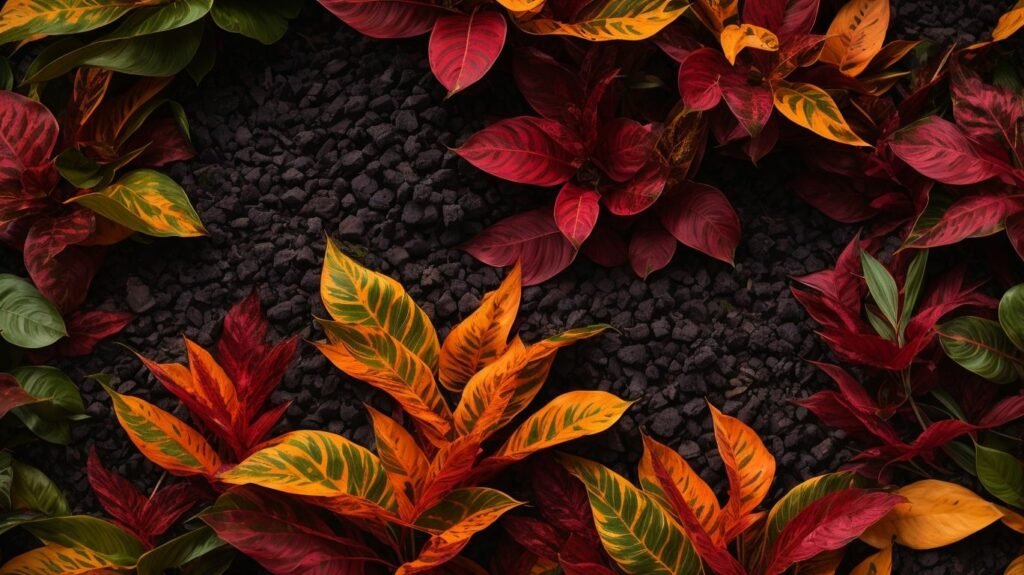Crotons, also known as Codiaeum variegatum, are popular indoor and outdoor plants known for their vibrant and colorful foliage. These tropical plants are native to Indonesia, Malaysia, and the Pacific Islands and are commonly grown as houseplants or in gardens for their stunning leaves. With over 100 different varieties, crotons come in a range of colors, sizes, and patterns, making them a favorite among plant enthusiasts.
To ensure that your crotons thrive and produce vibrant foliage, it is essential to provide them with the right growing conditions. The ideal conditions for crotons include temperature, light, humidity, watering, and fertilizer. However, the most crucial factor that determines their growth and health is the type of soil they are planted in.
The best soil for crotons is a well-draining, organic-rich, slightly acidic, and well-aerated soil. Crotons are sensitive to waterlogging and require good drainage to prevent root rot. Additionally, they prefer soil that is rich in organic matter and slightly acidic, with a pH between 5.5-6.5. This type of soil provides optimal nutrition for crotons and promotes healthy growth.
To prepare the best soil for crotons, you can follow the steps below:
- Choose the right soil components, such as potting soil, perlite, and peat moss.
- Mix the soil components in the right proportions, ensuring good drainage and aeration.
- Test the soil mixture by squeezing a handful to check if it holds its shape. It should break apart easily.
If you are unable to find potting soil, some alternatives that you can use for crotons include peat moss, coir, perlite, and vermiculite. These materials provide the necessary aeration, drainage, and nutrition for crotons.
In conclusion, providing the best soil for crotons is essential for their growth and appearance. By following these guidelines and preparing the ideal soil for your crotons, you can ensure that they thrive and add a pop of color to your home or garden.
Key Takeaways:
- Crotons thrive in well-draining, slightly acidic soil rich in organic matter and good aeration.
- Preparing the best soil for crotons involves choosing the right components, mixing them, and testing the soil mixture.
- Some alternatives to potting soil for crotons include peat moss, coir, perlite, and vermiculite.
What Are Crotons?
Crotons are tropical plants that are known for their colorful foliage. With large, glossy leaves in shades of red, yellow, orange, and green, they are popular for adding vibrancy to any space. These plants are native to regions like Indonesia, Malaysia, and the Pacific Islands, and they require warm temperatures and high humidity to flourish. They can be grown indoors or outdoors, depending on the climate.
Fun fact: Crotons are sometimes referred to as “Joseph’s Coat” because their leaves resemble a coat of many colors.
What Are The Different Types Of Crotons?
Crotons, scientifically known as Codiaeum variegatum, are popular tropical plants known for their vibrant and colorful foliage. There are several different types of crotons, each with its unique characteristics and leaf patterns. Here are some examples:
- Petra Croton: This type has large, oval-shaped leaves with bright shades of orange, red, and yellow.
- Mammy Croton: It features broad, leathery leaves in a mix of green, yellow, and red colors.
- Gold Dust Croton: This variety has small, speckled leaves with yellow spots that resemble gold dust.
- Mrs. Iceton Croton: It boasts narrow, elongated leaves with a mix of green, yellow, and creamy white colors.
- Oakleaf Croton: This type has elongated, pointed leaves that resemble the shape of an oak leaf.
Each type of croton brings its unique charm and can add a pop of color to any indoor or outdoor space. So, what are the different types of crotons? Let’s take a look at some popular varieties!
What Are The Ideal Growing Conditions For Crotons?
As a croton enthusiast, it is important to understand the ideal growing conditions for these vibrant and exotic plants. In this section, we will discuss the various factors that contribute to the successful growth of crotons, including temperature, light, humidity, watering, and fertilizing. By understanding these key elements, you can create the perfect environment for your crotons to thrive and flourish. Let’s dive into the details and discover the best practices for growing healthy and beautiful crotons.
1. Temperature
Temperature plays a vital role in the growth and well-being of croton plants. Follow these steps to ensure the ideal temperature for your crotons:
- Keep crotons in temperatures between 60°F and 85°F (15°C – 29°C).
- Avoid exposing them to temperatures below 50°F (10°C) as it can cause damage to their leaves.
- During winter, protect them from cold drafts and provide extra warmth if needed.
- Make sure the temperature remains consistent throughout the day and night.
Pro-tip: To promote healthy growth, consider placing crotons in an area with controlled temperature as they thrive best in a warm and stable environment.
2. Light
Light is an essential factor for the healthy growth of croton plants. Here are some important steps to consider:
- Choose a bright location: Place crotons in a spot that receives bright, indirect sunlight for at least 4-6 hours a day.
- Avoid direct sunlight: Direct sunlight can scorch the leaves, so it’s best to provide filtered or indirect light.
- Rotate the plant: To ensure even growth, rotate the croton plant every few weeks so that all sides receive adequate light.
- Watch for signs of inadequate light: If the leaves become pale or the plant starts stretching towards the light source, it may need more light.
- Consider supplemental lighting: In areas with limited natural light, using artificial grow lights can help provide the necessary light intensity for crotons.
3. Humidity
Maintaining the ideal humidity levels is crucial for the healthy growth of croton plants. To ensure the right humidity for your crotons, follow these steps:
- Monitor humidity: Use a hygrometer to measure the humidity levels in your home.
- Adjust humidity: Increase humidity by using a humidifier or placing a tray of water near the plants.
- Group plants: Cluster crotons together to create a microclimate with higher humidity.
- Mist leaves: Regularly mist the leaves of croton plants with water to increase humidity around them.
- Avoid drafts: Keep crotons away from vents, drafty windows, or doors that can cause dry air.
4. Watering
- Proper watering is crucial for the growth and health of croton plants.
- Regularly check the moisture level of the soil by inserting your finger about an inch deep.
- Only water when the top inch of soil feels dry, as overwatering can lead to root rot.
- When watering, make sure to provide enough water until it drains out of the bottom of the pot.
- To prevent waterlogged conditions, allow the soil to dry out slightly between waterings.
- Adjust your watering frequency according to the season and environmental conditions.
Fun Fact: Overwatering is a common cause of problems for croton plants, so it’s important to maintain a proper watering schedule.
5. Fertilizing
To ensure healthy growth and vibrant foliage, proper fertilizing is essential for croton plants. Follow these steps when fertilizing crotons:
- Choose a balanced, water-soluble fertilizer with a ratio such as 10-10-10 or 20-20-20.
- Follow the instructions on the fertilizer packaging for the correct dilution ratio.
- Apply the fertilizer to the soil around the base of the plant, being careful to avoid direct contact with the leaves.
- After applying the fertilizer, water the plant thoroughly to help it absorb the nutrients.
- Fertilize crotons every 6-8 weeks during the growing season (spring and summer).
By following these steps, you can ensure that your croton plants receive the necessary nutrients for healthy growth and vibrant foliage.
What Is The Best Soil For Crotons?
When it comes to growing healthy and vibrant croton plants, the type of soil used is crucial. In this section, we will discuss the best soil for crotons and why it is important for their growth. From well-draining soil to a slightly acidic pH, we will cover the key components that make up the ideal soil for these tropical plants. By understanding the characteristics of the best soil for crotons, you can ensure that your plants thrive and add beauty to your home or garden.
1. Well-Draining Soil
To ensure optimal growth of crotons, it is crucial to provide them with well-draining soil. Follow these steps to create the best soil for crotons:
- Choose a soil mix consisting of 50% high-quality potting soil.
- Add 25% perlite to the mix to improve drainage.
- Incorporate 15% vermiculite to retain moisture in the soil.
- Include 10% organic matter, such as compost or peat moss, to enhance soil fertility.
By following these steps, you can create a well-draining soil that promotes healthy growth and prevents waterlogging, which is essential for successfully cultivating crotons.
2. Rich In Organic Matter
A soil rich in organic matter is crucial for the successful growth of crotons. Organic matter provides essential nutrients, improves soil structure, and enhances moisture retention. Adding compost, well-rotted manure, or leaf mold to the soil can significantly increase its organic matter content. This will create a fertile environment for crotons to flourish.
A real-life example that emphasizes the importance of organic matter is the transformation of a wilted croton plant into a lush and vibrant one after being repotted in soil enriched with organic matter. The plant quickly regained its health and produced beautiful foliage, showcasing the numerous benefits of having a soil rich in organic matter.
3. Slightly Acidic pH
A slightly acidic pH is crucial for the optimal growth of croton plants. Follow these steps to achieve the ideal pH level for your crotons:
- Use a pH testing kit to check the pH level of your soil.
- If the pH is not slightly acidic, you can lower it by adding organic matter such as peat moss or compost.
- Thoroughly mix the organic matter into the soil.
- Re-test the pH level to ensure it is now slightly acidic.
Maintaining a slightly acidic pH in the soil is essential for crotons to efficiently absorb necessary nutrients and thrive in their growing environment.
4. Good Aeration
Proper aeration is essential for the healthy growth of crotons. Here are some tips to promote good aeration in the soil for your croton plants:
- Loosen the soil: Break up compacted soil to improve airflow and prevent waterlogging.
- Add organic matter: Incorporate compost or well-rotted manure into the soil to improve its structure and allow for better air circulation.
- Avoid overwatering: Excessive watering can lead to compacted soil and reduce oxygen availability. Water only when the top inch of soil feels dry.
- Use mulch: Apply a layer of organic mulch around the base of the plant to regulate soil temperature, retain moisture, and prevent compaction.
By following these steps, you can ensure that your crotons have access to the necessary oxygen for optimal growth and development.
How To Prepare The Best Soil For Crotons?
As any plant enthusiast knows, the soil is the foundation for a healthy and thriving plant. When it comes to crotons, a popular and vibrant houseplant, having the right soil is crucial for its growth and overall well-being. In this section, we will discuss how to prepare the best soil for crotons by carefully choosing the right soil components, mixing them in the correct proportions, and testing the resulting soil mixture. By following these steps, you can ensure that your crotons receive the ideal growing medium for optimal growth and vitality.
1. Choosing The Right Soil Components
Choosing the perfect soil components for crotons is vital for their overall growth and well-being. To help you select the ideal soil components, here is a step-by-step guide:
- Identify the needs of crotons: It is crucial to understand the specific requirements of crotons, such as well-draining soil and a slightly acidic pH.
- Research soil components: Take the time to research and find soil components that meet the identified needs, such as peat moss, coir, perlite, and vermiculite.
- Consider the proportions: Determine the appropriate ratios of each soil component based on crotons’ requirements and the characteristics of the components.
- Test the soil mixture: Mix the soil components together and test the resulting mixture by checking its texture, moisture retention, and drainage.
- Adjust as needed: If the soil mixture is too compact or retains too much moisture, make adjustments by adding more of the well-draining components.
By following these steps, you can create a well-balanced soil mixture that provides the optimal growing conditions for crotons, ensuring their successful development and thriving health.
2. Mixing The Soil Components
To properly mix the soil components for crotons, follow these steps:
- Choose the appropriate soil components, such as potting soil, perlite, and peat moss.
- Measure the quantities of each component based on the desired soil texture and drainage.
- Add the potting soil to a container and gradually mix in the other components, stirring well.
- Ensure the mixture is well-blended and free of any clumps or chunks.
- Test the soil mixture by squeezing a handful tightly and then releasing it. It should slightly hold its shape without being too compact or wet.
For alternatives to potting soil, consider using peat moss, coir, perlite, or vermiculite. These components can provide similar benefits for crotons’ growth. Experiment with different combinations to find the perfect mixture for your plants. Happy gardening!
3. Testing The Soil Mixture
To ensure the best soil mixture for your crotons, follow these steps for testing:
- Collect a soil sample from your pot or garden bed.
- Remove any debris or large particles from the sample.
- Break up any clumps and mix the soil thoroughly.
- Divide the soil into two equal portions.
- Use one portion for a pH test. Follow the instructions on a pH testing kit to determine the acidity or alkalinity of the soil.
- Use the other portion for a nutrient test. Take a soil sample to a local agricultural extension office or use a soil testing kit to analyze the levels of essential nutrients like nitrogen, phosphorus, and potassium.
- Based on the test results, adjust the soil pH and nutrient levels as needed by adding amendments or fertilizers.
- Retest the soil periodically to monitor its quality and make further adjustments if necessary.
What Are Some Alternatives To Potting Soil For Crotons?
While potting soil is the most commonly used growing medium for crotons, there are other options that can provide the necessary nutrients and drainage for these vibrant plants. In this section, we will explore four alternatives to potting soil for crotons: peat moss, coir, perlite, and vermiculite. Each of these options offers unique benefits and can be used either alone or in combination with potting soil to create a suitable environment for croton growth.
1. Peat Moss
Peat moss is a popular alternative to potting soil for crotons due to its ability to retain moisture and provide good drainage. Here are the steps to incorporate peat moss into your croton soil mix:
- Choose high-quality peat moss from a reputable supplier.
- Combine the peat moss with other soil components such as perlite and vermiculite to improve aeration and drainage.
- Thoroughly mix the peat moss and other components together in the desired proportions.
- Test the soil mixture by squeezing it in your hand – it should hold its shape without being too wet or too dry.
Using peat moss in your croton soil mix can help create optimal growing conditions and support the health and growth of your plants.
2. Coir
Coir is a popular alternative to potting soil for growing crotons. Made from coconut husks, coir is a sustainable and environmentally friendly option. It has excellent water retention properties, ensuring that the plants receive adequate moisture. Coir also provides good aeration to the roots, preventing waterlogging. Additionally, it is rich in nutrients, making it a great choice for gardeners looking for a natural and effective medium for growing crotons.
To use coir as a soil substitute for crotons, simply mix it with other components like perlite or vermiculite to improve drainage.
3. Perlite
Perlite is a lightweight and porous material that is commonly used in gardening, including for growing crotons. Here is a step-by-step guide to using perlite in croton soil:
- Choose a high-quality perlite that is free from impurities.
- Mix equal parts of perlite and potting soil or add perlite to your potting mix at a ratio of 1:1.
- Thoroughly blend the perlite and potting mix together to ensure even distribution.
- Check the moisture level of the soil by inserting your finger into the mixture. If it feels excessively damp, add more perlite to improve drainage.
- Plant your croton in the soil enriched with perlite, making sure to properly cover the roots.
Pro Tip: Perlite helps improve soil drainage and aeration, preventing root rot and promoting healthy root development in crotons.
4. Vermiculite
Vermiculite is a popular alternative to potting soil for crotons. This mineral undergoes a heating process, expanding into a lightweight and porous material. When incorporated into soil mixtures, vermiculite can improve drainage, retain moisture, and provide aeration to the roots of croton plants. It also helps prevent compaction and allows for better absorption of nutrients. For optimal croton growth, it is recommended to include vermiculite in the soil mixture when preparing for planting. Other alternatives that can be considered are peat moss, coir, and perlite. Experimenting with different combinations can help determine the best soil mix for these plants.
Wrapping Up
Summary
To ensure the growth and health of crotons, it is crucial to choose the right soil for them. Crotons thrive in well-draining soil that is enriched with organic matter. A perfect soil mix for crotons would consist of equal parts potting soil, perlite, and peat moss, providing adequate aeration, moisture retention, and nutrient availability. Adding slow-release fertilizer to the soil can also aid in promoting healthy growth. Remember to water the plants thoroughly, but allow the soil to dry out slightly between waterings for optimal results.
Frequently Asked Questions
What is the best soil mix for croton plants?
The best soil mix for croton plants is one that holds moisture but also drains well. It should have a slightly acidic pH level of 4.5-6.5. A recommended soil mix for crotons is 3 parts all-purpose potting soil, 2 parts pine bark fines or coco coir, and 1 part perlite or horticultural sand.
Why is proper soil mix important for croton plants?
Proper soil mix is crucial for the success of croton plants. These plants have specific needs that mimic their natural habitat, including moisture, oxygen, nutrients, and the right soil composition. Choosing the right soil mix is essential for the health and growth of croton plants.
What are the signs of using the wrong soil mix for croton plants?
Signs that you are using the wrong soil mix for crotons include falling leaves, browning or yellowing leaves, wilting or drooping leaves, and root rot. It is important to assess all growing conditions to determine if the soil needs to be changed for a croton plant.
What are some important aspects to consider when choosing soil for croton plants?
Some important aspects to consider when choosing soil for croton plants are moisture retention, proper drainage, slightly acidic pH level, and nutrient richness. Crotons are heavy feeders, so a rich, organic-laden soil is ideal for their growth and health.
Can pre-mixed soils be used for croton plants?
Yes, pre-mixed soils are available for those who prefer not to make their own soil mix. However, it is important to check the ingredients and ensure that it meets the basic needs of croton plants, such as a slightly acidic pH level and good drainage.
What are some recommended organic additives for croton plants?
Some recommended organic additives for croton plants are sphagnum peat moss, compost, and coco coir. These can help improve moisture retention and nutrient richness in the soil. Using a croton fertilizer during the spring and summer months can also provide vital elements for the plant’s growth and health.
The best soil mix for croton plants is one that holds moisture but also drains well. It should have a slightly acidic pH level of 4.5-6.5. A recommended soil mix for crotons is 3 parts all-purpose potting soil, 2 parts pine bark fines or coco coir, and 1 part perlite or horticultural sand.
Proper soil mix is crucial for the success of croton plants. These plants have specific needs that mimic their natural habitat, including moisture, oxygen, nutrients, and the right soil composition. Choosing the right soil mix is essential for the health and growth of croton plants.



